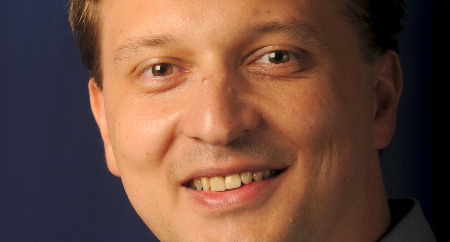Within three years, an Israeli scientist and his American research partner plan to develop a cost-effective self-sustaining nuclear reactor.

Though the very mention of nuclear energy makes many people nervous, it’s no secret that we will come to depend on it more and more as highly-polluting and costly fossil fuels go the way of the dinosaurs from which they derive. That’s why the world’s best minds are focused on finding efficient and inexpensive methods of generating nuclear energy.
Israeli nuclear engineer Eugene Shwageraus is one of those minds. The 37-year-old Ben-Gurion University (BGU) of the Negev lecturer and his research partner, Dr. Michael Todosow of the Brookhaven National Laboratory in New York, received a three-year Energy Independence Partnership Grant last May from the US-Israel Binational Science Foundation to develop a self-sustainable fuel cycle for light water reactors.
Speaking to ISRAEL21c from the Massachusetts Institute of Technology, where he is working during the first year of the grant, Shwageraus explains what this means.
Building on proven nuclear technology
The most common type of nuclear reactor in use for the past 40 or 50 years is the light water reactor (LWR). It is powered by uranium fuel and cooled with plain (‘light’) inexpensive water. The trouble is that LWRs are quite inefficient in natural resource consumption, using less than one percent of the energy that could potentially be extracted from the uranium.
“In the 1970s, when the availability of uranium was feared to be a real concern, people started to develop ‘fast breeders’ that produce fuel at a faster rate than they consume it,” says Shwageraus. “But in order to engineer such a system, they had to move away from cooling the reactors by water. They were cooled by liquid metal, typically molten sodium, requiring complex engineering. That complicates the system to the extent that fast breeders become much more expensive than light water cooled reactors.”
Both due to the cost factor and because – as it turns out – uranium actually is quite plentiful, fast breeders never came into widespread use. Despite its energy inefficiency, the standard is still the LWR, found in about 450 civil and naval installations around the world.
And that’s where the Israeli scientist’s innovation comes in. By taking advantage of proven LWR technology, he and Todosow intend to make a cost-effective light water cooled reactor that will be as efficient as a fast breeder in extracting energy from the fuel.
“The process of development is three years, and at that time we’ll choose from among several ways to see which is optimal to combine safety, economics and resource utilization,” Shwageraus relates.
Collaborating on alternative, renewable solutions
The goal is a self-sustaining reactor, meaning one that will produce and consume about the same amounts of fuel. This isn’t possible with uranium and light water coolant. The better choice is thorium, whose nuclear properties offer considerable flexibility in the reactor core design. Some experts believe that the energy stored in the earth’s thorium reserves is greater than what is available from all other fossil and nuclear fuels combined.
Thorium in the earth’s crust is estimated to be at least three times more abundant than uranium, and not difficult to extract, according to Shwageraus. It can be found in large quantities in India, the United States, Australia and Turkey, as well as Norway, which is where a Swedish chemist first discovered the element in the 19th century and named it after the Norse god of thunder. While it has long been considered theoretically possible to use it to produce nuclear energy, this potential has yet to be realized.
The competition for BSF Energy Independence Partnership grants was tough, and Shwageraus admits he was pleasantly surprised to receive one. The program enables scientists from Israel and the United States to work collaboratively on finding alternative and renewable energy solutions. Supported by the Ministry of National Infrastructures, the initial phase awarded $1.2 million in funding for six projects in solar energy, biofuels and clean, safe nuclear energy.
Shwageraus, who earned his bachelor’s and master’s degrees at BGU and a Ph.D. in nuclear engineering at MIT, came to Israel at age 20 from his native Russia. He and his wife and two young children plan to return to Israel next year, where he will continue the project.
“I see it as a mission,” he states. “Nuclear energy is a strategic option for Israel and I want to be part of it. It’s a good thing for the country and for global society.”













